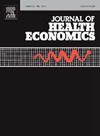生物年龄和预测未来的医疗保健利用。
IF 3.6
2区 经济学
Q1 ECONOMICS
引用次数: 0
摘要
我们探讨了表观遗传生物年龄在预测后续医疗保健使用方面的作用。我们使用了英国 "了解社会 "小组的纵向数据,利用从基线开始 5-12 年收集的基线表观遗传生物年龄测量数据以及全科医生(GP)咨询、门诊(OP)就诊和医院住院(IP)护理数据。通过使用最小绝对收缩和选择算子(LASSO)回归分析,并考虑到参与者之前的健康状况、基线生物学基础健康状况和社会经济预测因素,我们发现生物年龄被选为未来全科医生咨询和 IP 护理的预测因子,而未来门诊就诊的预测因子是年代年龄而非生物年龄。通过选择后预测分析和 Shapley-Shorrocks 分解,将我们首选的预测模型与用纪年年龄替代生物年龄的模型进行比较,结果表明,在预测未来 IP 护理的模型中,生物年龄的作用比全科医生会诊的 "把关 "作用更大。本文章由计算机程序翻译,如有差异,请以英文原文为准。
Biological age and predicting future health care utilisation
We explore the role of epigenetic biological age in predicting subsequent health care utilisation. We use longitudinal data from the UK Understanding Society panel, capitalising on the availability of baseline epigenetic biological age measures along with data on general practitioner (GP) consultations, outpatient (OP) visits, and hospital inpatient (IP) care collected 5–12 years from baseline. Using least absolute shrinkage and selection operator (LASSO) regression analyses and accounting for participants’ pre-existing health conditions, baseline biological underlying health, and socio-economic predictors we find that biological age is selected as a predictor of future GP consultations and IP care, while chronological rather than biological age is selected for future OP visits. Post-selection prediction analysis and Shapley-Shorrocks decompositions, comparing our preferred prediction models to models that replace biological age with chronological age, suggest that biological ageing has a stronger role in the models predicting future IP care as opposed to “gatekeeping” GP consultations.
求助全文
通过发布文献求助,成功后即可免费获取论文全文。
去求助
来源期刊

Journal of Health Economics
医学-卫生保健
CiteScore
6.10
自引率
2.90%
发文量
96
审稿时长
49 days
期刊介绍:
This journal seeks articles related to the economics of health and medical care. Its scope will include the following topics:
Production and supply of health services;
Demand and utilization of health services;
Financing of health services;
Determinants of health, including investments in health and risky health behaviors;
Economic consequences of ill-health;
Behavioral models of demanders, suppliers and other health care agencies;
Evaluation of policy interventions that yield economic insights;
Efficiency and distributional aspects of health policy;
and such other topics as the Editors may deem appropriate.
 求助内容:
求助内容: 应助结果提醒方式:
应助结果提醒方式:


